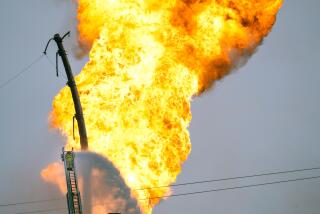Oil platform fire a disaster mainly for PR
Reporting from New Orleans — Louisianans expressed relief Friday that another offshore tragedy had been averted: A second oil facility that caught fire this week did not cause a leak, and no one was hurt.
But many here were also worried that Thursday’s production-platform blaze dealt a public relations blow to an industry that is crucial to the regional economy and is still reeling from the April 20 blowout of the Deepwater Horizon rig.
When she first heard about the fire, New Orleans legal assistant Terri Heimel said to herself, “Oh God, how could this happen again? It’s like, damn — now we’ll never get our authority back to drill.”
The fire engulfed part of the production platform, forcing all 13 crew members to jump in the water more than 100 miles from the Louisiana coast and await rescue.
In an interview Friday, Patrick Cassidy, spokesman for Mariner Energy Inc., the Houston-based owner, said that the fire “wasn’t related” to the platform’s seven wells. Although he would not say what the likely cause was, Cassidy said the damage “appears to have been limited to an area in and around the living quarters.”
Nicholas Pardi, a spokesman for the Bureau of Ocean Energy Management, would not comment on Cassidy’s statement, noting that the agency was in the midst of its first full day of investigating the fire.
If true, Cassidy’s assertion demonstrates how different Thursday’s fire was from the BP disaster, in which an uncontrollable gush of oil and gas from below the earth’s surface fed an inferno that killed 11 workers and eventually sank a deep-water drilling rig.
The Mariner Energy incident took place on a shallow-water production platform where no drilling was taking place.
Yet the incident continued to resound Friday on Capitol Hill, where the House has already passed far-reaching legislation that would impose new environmental safeguards on offshore drilling, repeal oil-industry-friendly provisions of energy policy, hit producers with a new tax to fund conservation programs and eliminate the $75-million liability cap on economic damages from oil spills.
A Senate vote on the spill legislation was postponed until at least fall after running into opposition from Republicans and some Democrats from energy-producing states, including Louisiana.
In a letter Friday to Interior Secretary Ken Salazar, Nick J. Rahall II (D-W.Va.), chairman of the House natural resources committee, requested documents, e-mails and inspection reports regarding the Mariner platform, saying the fire “highlights all too clearly that the risks of offshore drilling are not limited to deep water.”
Within hours after the fire, a number of environmental groups said it was further proof that offshore activity was in need of greater oversight, and that the Obama administration’s deep-water drilling moratorium should be extended.
The moratorium was enacted after the BP spill to give the government time to review existing safety regulations; officials said it could last through Nov. 30.
In an unsigned editorial Friday, New Orleans’ Times-Picayune called environmental groups’ conflation of the BP and Mariner disasters “disingenuous,” noting that the platform, which was in about 350 feet of water, was not covered by the deep-water moratorium.
The environmental nonprofit Oceana was among those that stood by the call for an extended moratorium on all offshore drilling.
“Not much has changed,” said Oceana’s senior campaign director, Jacqueline Savitz. “It’s just a matter of time until the next disaster.”
Federal statistics show that the Gulf of Mexico saw 514 offshore explosions or fires between 2006 and 2009. But 486 of those were considered “incidental,” meaning they caused damage of $25,000 or less. Only two fires caused more than $1 million in damage.
Don Briggs, president of the Louisiana Oil & Gas Assn., called it “a stretch” to use Thursday’s fire to indict the offshore industry’s record.
“Now, will the critics of the industry take it and run with it, along with everything else? Probably so,” he said. “But when you step back and look at the big picture, when you look at reality, we’re going to have accidents. Every industry has them.”
Cassidy said the crew had been performing maintenance on the platform Thursday morning, painting and cleaning with high-powered water blasters. But he said those activities are not believed to have caused the fire.
“The fire alarms were activated,” Cassidy said. “The crew assessed the fire, assessed the situation, and determined to evacuate the facility.” Before they did so, they were able to “shut off all processes” on the platform, he said.
Cassidy said the company knew the wells were not leaking afterward because meters that track the flow of oil through a pipeline were “registering zero.”
The Coast Guard, in a press release, said a sheen on the water Thursday was not crude from a leaking well, but rather “petroleum runoff caused by firefighting efforts.”
Cassidy said the overall damage to the multimillion-dollar platform was “minimal.” In this case, he said, “The systems were in place, and they worked. Nobody was hurt, and there was no environmental damage.”
More to Read
Sign up for Essential California
The most important California stories and recommendations in your inbox every morning.
You may occasionally receive promotional content from the Los Angeles Times.










